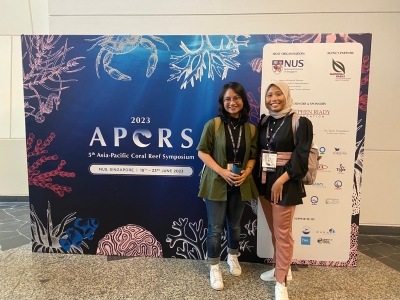IPB University Students Reveal Findings of the Spermonde Archipelago Coral Reef Restoration Study at NUS

IPB University postgraduate students from the Marine Science Study Program (IKL), Faculty of Fisheries and Marine Sciences (FPIK) shared their findings at the 5th Asia-Pacific Coral Reef Symposium (APCRS) 2023. The event which was held at the National University of Singapore (NUS) on mid-June became a platform for the two IPB University students, Rindah Talitha Vida and Cut Aja Gita Alisa, to share the results of their research in an effort to support coral reef restoration activities.
The research conducted by Rindah and Gita was a collaborative research between IPB University, the National Research and Innovation Agency (BRIN), Hasanuddin University, Lancaster University and Montpellier University. Under the guidance of Dr Tries Razak (BRIN) and Dr Beginer Subhan (IPB University), they confidently presented their research which was conducted using a number of approaches.
Rinda in her presentation entitled Assessing Coral Reef Restoration Success by Quantifying Three-Dimensional Habitat Complexity in Spermonde Archipelago, Indonesia used a photogrammetric method to assess the effectiveness of restoration efforts in restoring the ecological function of coral reef habitat through the value of structural complexity.
Rinda said, in conditions of a healthy coral reef ecosystem, the physical structure of coral reefs had a high level of complexity compared to ecosystems that were experiencing degradation. This caused the level of rugosity, which reflected the non-uniformity of the relief form or the irregular topography of the coral reefs, to be low.
"A high rugosity value indicates a healthier coral reef. This means that corals grow well and have many variations of coral cover colony forms so as to form a complex topography. Of course this will be very closely related to the abundance of biota commonly found around coral reefs such as fish, due to the abundance of coral polyps as a food source," said Rindah.
Located on Bontosua Island, Spermonde Islands, South Sulawesi, Rindah also mentioned restoration efforts being made to improve the coral reef ecosystem on the island. The restoration effort was considered successful because it showed a high rugosity value in the restored coral ecosystem.
On the other hand, Gita explained her findings entitled Quantifying the Aesthetic Value of Highly Maintenance Restored Coral Reefs in Indonesia at the same location as Rindah. Gita stated that one of the services provided by coral reef ecosystems to humans was known as cultural ecosystem services. “When we dive in beautiful coral reef sites, we will feel happy, satisfied, amazed. So, that's what we call a cultural ecosystem service," explained Gita.
Gita continued, damaged to coral reef ecosystems would reduce the value of ecosystem services, so restoration efforts were needed to improve coral reef ecosystems. She said the Mars Assisted Reef Restoration System (MARSS) was a strong and measurable long-term recovery method. This method was capable of rebuilding coral reefs quickly, was very well maintained and was highly monitored by using deep learning algorithms to produce the right aesthetic value and color evaluation models.
“These findings show that a degraded coral ecosystem has a lower aesthetic value. In a restored coral ecosystem, the aesthetic value looks higher and even almost resembles a healthy coral ecosystem," explained Gita.
Dr Beginer Subhan, the supervising lecturer for the two students as well as an Indonesian coral researcher, was pleased that this IPB University postgraduate student was given the opportunity to conduct research with world restoration experts.
"This research is very interesting and not much has been done in Indonesia. Of course in the future, similar collaborations and research can be replicated in other locations in Indonesia," concluded Dr Beginer. (*/Rz) (IAAS/SHY)



